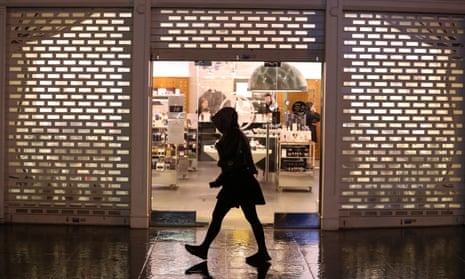UK is only G7 country with smaller economy than before Covid-19
ONS says GDP grew by 0.2% in three months to June, suggesting Britain is not in recession

A weaker than expected recovery from the coronavirus pandemic has left the UK as the only G7 country with a smaller economy than in early 2020, according to official figures likely to further undermine the government’s tax-cutting measures.
Before the prime minister and chancellor’s meeting with the head of the government’s independent forecaster on Friday morning, the Office for National Statistics (ONS) released figures showing that rather than the economy being 0.6% larger than in February 2020, a combination of a deeper recession during the pandemic and a weak recovery had left it 0.2% smaller.
A better than expected performance in the second quarter of this year, overturning a previous estimate of a 0.1% fall to a 0.2% increase and reversing an assessment that the UK was in recession by June, was not enough to boost GDP growth sufficiently to recover from the first lockdowns in 2020 that brought large parts of the economy to a standstill.
Analysts said Richard Hughes, the head of the Treasury’s independent forecaster, the Office for Budget Responsibility, would be forced by the new figures to take a tough stance on assessing the impact of further borrowing on the public finances.
All the other major economies in the G7, including France and Germany, recovered strongly enough to be larger than they were in February 2020.
“Despite the better news on the performance of the economy in the second quarter, the overall picture is that the economy is in worse shape than we previously thought,” Paul Dales, an economist at Capital Economics, said.
“And that’s before the full drag from the surge in inflation and leap in borrowing costs have been felt.”
The Bank of England said earlier this month that it understood the UK economy was already in recession after it forecast a fall in GDP of 0.1% in the third quarter, leading to two consecutive quarters of negative growth, but the ONS estimate of growth in the second quarter shows that while the economy is depressed, it is unlikely to enter a recession until the end of the year.
Separate data showed house prices failed to rise month on month for the first time since July 2021, a latest sign of the slowdown in the market caused by the cost of living squeeze and rising interest rates.
Kwasi Kwarteng published an economic plan on Friday last week that he said would spur growth by cutting taxes.
However, investors responded to the mini-budget by selling the pound and offloading British government bonds, increasing the interest bill paid by the Treasury.
Samuel Tombs, the chief UK economist at Pantheon Macroeconomics, said the figures suggested that the damage inflicted by Covid-19 and Brexit on to the economy’s ability to grow was even larger than previously thought.
“These revisions will compel the OBR to revise down further its estimates for future potential GDP,” he said.
The recent turmoil in British financial markets has also highlighted the UK’s large current account deficit. The amount by which the value of imports exceeds that of exports has worsened since the financial crisis of 2008 and the Brexit vote despite steep falls in the value of the pound that make exports cheaper.
ONS data showed the current account gap in the April-June period shrank to £33.8bn, or 5.5% from a £43.9bn deficit in the first quarter, which was revised down from an earlier estimate.
However, the January-March deficit remained the biggest on record, the ONS said, revealing the difficulties UK exporters are having finding markets for their products and services.
#Coronavirus, #Economy
Published on The Perfect Enemy at https://bit.ly/3SJ7x4V.
Comments
Post a Comment
Comments are moderated.